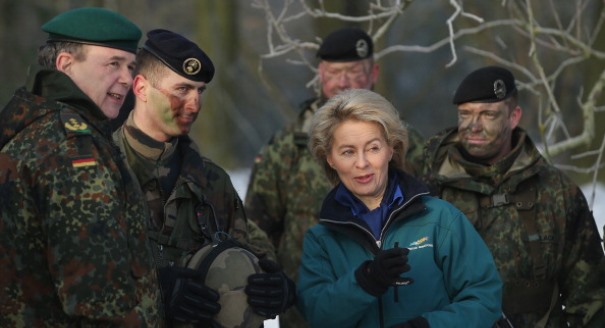Is there something cooking in German security and defense policy? At first glance, it certainly looks like it. The new German defense minister, the ambitious Ursula von der Leyen, caused a small political ruckus by announcing in an interview with Der Spiegel on January 25 that Germany would have to take more military responsibility internationally.
Von der Leyen, it seems, wanted to put some spunk into the usually suppressed German defense debate ahead of the upcoming Munich Security Conference. On the surface, she scored a moderate success. Commentators were quick to reply, with both applause and disdain.
But what looks like a robust new position—welcomed by many who thought Germany’s traditional position of military restraint was shameful and untenable—has little substance to it. The German position on all things military continues to be hampered by the usual political schizophrenia.
The problem starts with numbers. Von der Leyen’s comments were sparked by the debate about German contributions to French-led military missions in Mali and the Central African Republic. On Mali, the German defense minister said that she could well imagine upping her country’s mandate from 180 military trainers to 250. But that is small fry, almost not worth mentioning in the wider debate about a changing global security landscape.
What’s more bothersome is that the minister used the full array of big geostrategic vocabulary to get to that minimal result. What arguments will she use when Berlin is requested to actually make a meaningful contribution?
And so the entire interview with Der Spiegel is a demonstration of what’s wrong with the German defense debate. It is a great example of the kind of painful doublespeak that any German politician has to embrace when entering the minefield of discussing Germany’s role as a military player.
In her remarks, von der Leyen fell into three classic traps of the German security and defense debate.
The first trap was to talk about numbers instead of risks. All recent German defense ministers have been great at this. Pointing to Germany’s contribution in Afghanistan, the third-biggest among NATO members, German politicians demand respect for the size of Germany’s engagement.
What they do not understand is that numbers are only one metric of proper participation. Another, more meaningful measure is the nature of the risk a country takes when sending in its troops. On that score, Germany has not demonstrated that it is up to par with its allies. “Combat is not for us” has been the catchphrase too many times, recently wheeled out again in the case of the Central African Republic.
Germany has a reputation for being a partner that will engage militarily but only if others do most of the tough stuff. No German politician likes to hear this truth. But interviews like the one given by von der Leyen only confirm that common perception.
The second trap that the minister fell into is that, like all leading German politicians, she repeated the old canard that the Bundeswehr is a Parlamentsarmee—an army deployed by parliament, not by the executive. While making decisions about deploying troops is indeed a bit more difficult in Germany than it is elsewhere, it is shameful for a government in a parliamentary system to hide behind the legislature in military affairs.
In such systems, governments exist only because they have a majority in parliament. If a government cannot find the votes to deploy troops into a mission it has deemed necessary, then it is at best a much weakened government.
A Parlamentsarmee can exist only if the legislature has a political position distinct from that of the government. In a parliamentary system, that is not usually the case. The German military is just as much an executive tool as it is a parliamentary one. But in the morally hypercharged debate in Germany, it is much more comfortable for the government to assign responsibility for military missions to parliament, in the hope of staying politically clean.
Unfortunately, the idea of a Parlamentsarmee has become a mantra in German politics. Everyone needs to subscribe to it to avoid being branded a reckless military adventurer. Von der Leyen did not find the courage to break out of that established narrative.
The third, and perhaps most bothersome, trap is that von der Leyen’s comments confirmed the complete absence of any real strategic debate about the political goals the German military should serve. Yes, she used all the big words. Yes, globalization creates new threats and brings distant places closer together. Yes, in such a world, security and defense policy faces new challenges. But in reality, Germany is debating only what others say should be debated.
It is certainly a great virtue to think of Germany’s military role exclusively in terms of alliances and close multilateral partnerships. But it is not a virtue to be a follower in debates shaped by others. Germany needs its own definition of what kind of world it wants to shape, what kind of interests it wants to defend, and what kind of price it is willing to pay.
Only a shadow of that discussion exists—a shadow that uses all the right words but creates no substance, as it assigns Germany a purely reactive role, not that of a driver. Ursula von der Leyen, contrary to appearances, has not yet changed this. Not much is cooking in German security and defense policy.






.jpg)